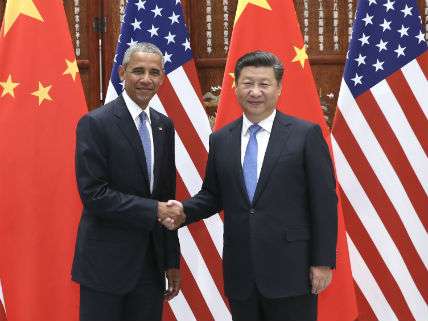Obama and Xi 'Ratify' Paris Climate Change Agreement
But remember, the Paris Agreement is NOT a treaty!

President Barack Obama and Chinese President Xi Jinping announced at the G-20 Summit in Hangzhou today that both countries will join the Paris Climate Change Agreement. The White House must be annoyed that lots of headlines are declaring that President Obama is "ratifying" the the agreement. The Paris Agreement will come into effect 30 days after 55 countries emitting at least 55 percent of the world's greenhouse gases commit to it. The U.S. and China emit about 40 percent of the world's greenhouse gases. In March, 2015, President Obama submitted the U.S.'s Intended Nationally Determined Contribution pledge to cut by 2025 U.S. greenhouse gas emissions by 26-28 percent below their levels in 2005. At the Hangzhou conference, President Obama reaffirmed those cuts and President Xi restated that China would begin cutting its emissions around 2030 or so. But what about that pesky "ratification" issue?
The Constitution provides that the President "shall have Power, by and with the Advice and Consent of the Senate, to make Treaties, provided two-thirds of the Senators present concur." In order for a treaty to be ratified two-thirds of the Senate must vote in favor of a resolution of ratification. If the resolution passes, then ratification takes place when the instruments of ratification are formally exchanged between the United States and the relevant foreign governments.
The Paris Agreement was specifically crafted during the United Nations negotiations to try to get around this provision of the Constitution. As I reported in my article, "Obama's Possible Paris Climate Agreement End Run Around the Senate," back in 2014 from the United Nations Lima climate change conference:
A 2010 Congressional Research Service (CRS) legal analysis of climate agreements … notes that a 1992 Senate Committee on Foreign Relations report dealing with the ratification of the UNFCCC (United Nations Framework Convention on Climate Change) flatly stated that a "decision by the Conference of the Parties to adopt targets and timetables would have to be submitted to the Senate for its advice and consent before the United States could deposit its instruments of ratification for such an agreement." The 1992 Senate report also explicitly added that any presidential attempt "to reinterpret the Convention to apply legally binding targets and timetables for reducing emissions of greenhouse gases to the United States" would also require the Senate's prior advice and consent.
The State Department's own Foreign Affairs Manual notes that presidents may conclude executive agreements in three cases, e.g., pursuant to a treaty already authorized by the Senate; on the basis of existing legislation; and pursuant to his authority as Chief Executive when such an agreement is not inconsistent with legislation enacted by the Congress. Consequently, President Obama might assert that he has the authority to bind the U.S. to take on international obligations under the Paris climate agreement because it is pursuant to the already authorized UNFCCC and is consistent with existing federal environmental legislation.
On the other, the Manual offers guidance for deciding when a treaty or when an executive agreement is appropriate. Relevant considerations include (1) the extent to which the agreement involves commitments or risks affecting the nation as a whole, (2) whether the agreement is intended to affect State laws, and (3) the preference of the Congress as to a particular type of agreement. Clearly any international agreement that purports to impose legal limits on the emissions of greenhouse gases would involve risks to the nation as a whole and affect state laws. And, as noted earlier, the Senate has plainly stated that setting any greenhouse gas reduction targets and timetables under the UNFCCC would require its advice and consent.
As I predicted, President Obama is asserting that he is concluding an executive agreement and so he can commit the U.S. to joining the Paris Agreement because it is merely an extension of our obligations under the already ratified UNFCCC.


Show Comments (224)